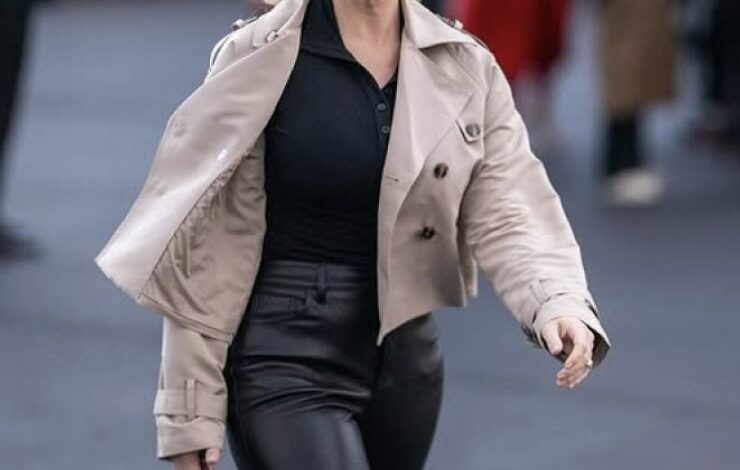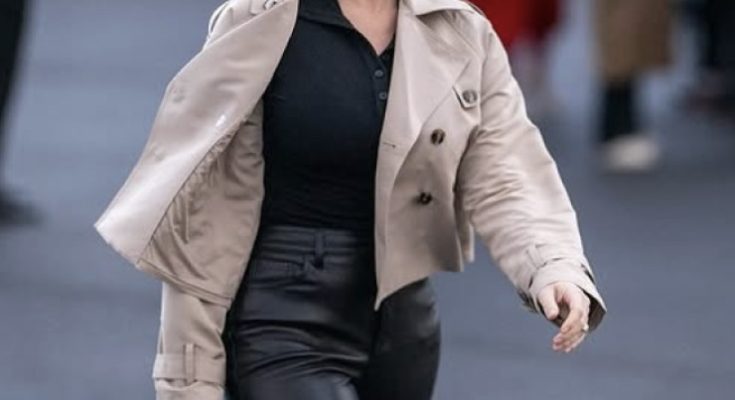
White House Press Secretary Karoline Leavitt has once again found herself at the center of online controversy — this time, not for what she said at the podium, but for what she carried on her arm.
Over the weekend, Leavitt, 27, shared a series of Instagram photos that drew both praise and criticism. The post, which seemed innocent enough at first glance, quickly exploded into debate after eagle-eyed users noticed one particular detail: her handbag.
The designer accessory — a Louis Vuitton Neverfull MM tote worth over $2,000 — caught attention because of recent comments Leavitt made about France, the country where the luxury brand originated.
A Sharp Rebuke to France
The controversy began days earlier when Leavitt fired back at a French politician who suggested that the United States should return the Statue of Liberty — France’s 19th-century gift commemorating independence and friendship between the two nations.
Leavitt’s response was as blunt as it was patriotic.
“My advice to that unnamed low-level French politician,” she wrote on X, “would be to remember that it’s only because of the United States of America that the French aren’t speaking German right now. They should be thanking our great country, not insulting it.”
Her statement, while applauded by many of her supporters, reignited long-standing tensions between American and European commentators. The exchange became fodder for talk shows, international press, and a wave of memes — some mocking Leavitt’s fiery tone, others celebrating her unapologetic nationalism.
But when her latest photo surfaced, the online conversation took a different turn.
The Handbag Heard Around the Internet
In the photo, taken outside the White House, Leavitt is seen smiling in a fitted navy dress, hair perfectly styled, and — most notably — carrying a Louis Vuitton tote, one of France’s most recognizable luxury exports.
Within hours, commenters flooded her post with remarks about the perceived contradiction.
One user wrote, “So we’re boycotting France but flexing with a Louis Vuitton? Make it make sense.”
Another chimed in: “Why slam France one day and wear their luxury label the next?”
The comments piled up quickly, and soon the handbag itself became a political talking point.
Critics accused her of hypocrisy, suggesting that her fashion choices undercut her nationalist rhetoric. Others brushed it off as another example of how female politicians face scrutiny for things that would go unnoticed if done by men.
Still, Leavitt’s supporters came to her defense just as fast.
“Absolutely stunning representation of our country!” one follower wrote. “You’re young, classy, and confident — that’s what America needs.”
Another fan commented, “She can carry whatever bag she wants. Maybe France should be grateful an American official is giving them free advertising.”
Balancing Power and Perception
At just 27, Leavitt is already the youngest White House Press Secretary in U.S. history — a fact that continues to divide opinion. Her age and rapid ascent have drawn both admiration and skepticism. Supporters see her as a symbol of generational change; detractors call her inexperienced and overly combative.
Her communication style mirrors the administration she represents: sharp, unapologetic, and media-savvy. Whether she’s fielding questions about foreign policy or cultural dustups, Leavitt has proven she knows how to command attention — and control a narrative.
Still, this latest incident underscores the tightrope she walks daily as a public figure: balancing image and ideology in a world where every accessory, quote, and caption can turn into a viral moment.
For most press secretaries, a handbag would never make headlines. But in today’s hyper-connected landscape, optics can carry more weight than policy statements.
And while her Louis Vuitton choice may seem trivial, it reflects a larger tension between personal expression and political symbolism.
A Weekend Away From the Noise
Despite the social media storm, Leavitt didn’t appear bothered. Rather than addressing the controversy, she spent the weekend offline, posting personal photos that showed a softer side of her life — one focused on family instead of politics.
One post featured her young son standing on a chair in the kitchen, hands covered in flour, helping her bake muffins. “Sunday morning muffins with my sous chef,” she captioned it, alongside a heart emoji.
Another photo showed her son, Niko, being pushed in a stroller by his great-grandmother. “Niko being pushed by his great grandma,” she wrote. “Four generations of love.”
For her supporters, these moments reinforced why they admire her — a young mother juggling one of the most demanding political roles in Washington while keeping her family close.
Critics, however, weren’t so easily swayed. Some accused her of using family imagery to deflect attention from the handbag controversy. Others argued that the online backlash said more about society’s obsession with appearances than about Leavitt herself.
The Double Standard at Play
What’s undeniable is how quickly female politicians become lightning rods for fashion-based criticism. From Kamala Harris’s Converse sneakers to Melania Trump’s stilettos, what women in power wear often overshadows what they say.
Political analyst Dana Cummings noted, “When a male press secretary wears a $3,000 suit, no one questions his patriotism or priorities. But a woman with a designer handbag? Suddenly it’s a national conversation about hypocrisy.”
The Louis Vuitton debate fits neatly into this pattern — a small detail magnified into a cultural argument about image, privilege, and authenticity.
Staying the Course
As for Leavitt, she hasn’t publicly commented on the handbag incident, nor has she deleted the photo. Her social media remains active and upbeat, focused on her work, public appearances, and family life.
If anything, the episode has only amplified her visibility — and perhaps, to her supporters, her relatability.
“She’s young, she’s stylish, and she doesn’t apologize for it,” one admirer wrote on X. “If that bothers people, that says more about them than about her.”
Her critics, meanwhile, argue that public figures must live up to the standards they promote — especially those in positions of influence. “You can’t slam France and then flaunt their fashion,” one tweet read. “It’s not illegal, but it’s tone-deaf.”
For now, Leavitt seems content to let the chatter fade.
In Washington’s high-stakes political arena, moments like these often blow over as quickly as they erupt. But they leave behind subtle reminders of how every gesture, every wardrobe choice, can be dissected under the glare of public scrutiny.
Whether intentional or not, Leavitt’s Louis Vuitton bag has become a symbol of that very contradiction — a reminder that politics today isn’t just about what leaders say but also about what they wear.
And as the youngest press secretary in modern history, she’s learning that lesson in real time: in a world obsessed with appearances, authenticity might just be the rarest luxury of all.










